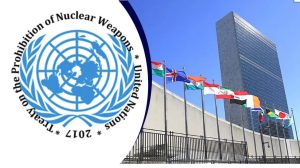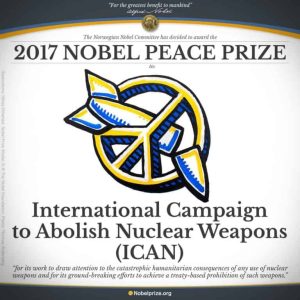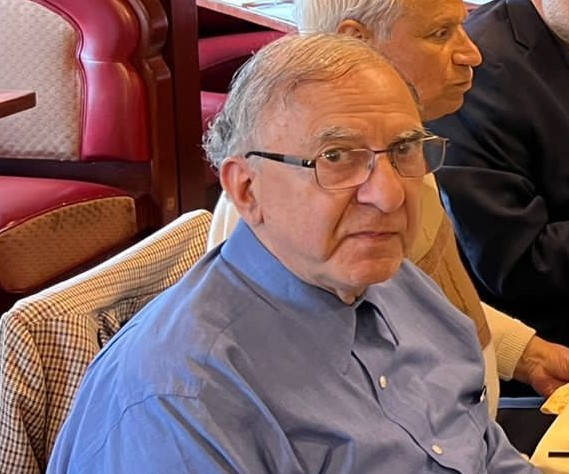By Dr. Ghulam Nabi Fai
Kashmir issue especially the Indian Illegally Occupied Jammu and Kashmir (IIOJK) is a tipping point to create a nuclear disaster in South Asia that can grip entire globe further, if not deterred in time. Justice should also be served by global powers for the Kashmiri people. How UN and world powers can play their role?
The second Meeting of States Parties to the Treaty on the Prohibition of nuclear weapons started at the United Nations Headquarters on November 27 and will continue until December 1, 2023. Ambassador Juan Ramón de la Fuente (Mexico) was elected as the President of the Meeting.
The Secretary-General of the United Nations, António Guterres, emphasized the significance of the treaty as a step towards a world free of nuclear weapons and a demonstration of support for multilateral approaches to nuclear disarmament.
Ambassador Melissa Parke of Australia and the Executive Director of ‘International campaign to Abolish Nuclear Weapons’ (ICAN) warned that nuclear-armed states are spending billions to expand their arsenals instead of fulfilling disarmament obligations. This, she argued, is a detriment to the world’s poor and an insult to those valuing peace. She called for multilateral approaches to peace, security, and adherence to international law.

During the opening statements, Ambassador Melissa Parke of Australia and the Executive Director of the International Campaign to Abolish Nuclear Weapons (ICAN) issued a cautionary message. They highlighted the extravagant expenditures by nuclear-armed states on enhancing and expanding their arsenals, characterizing it as a misallocation of resources that adversely impacts the world’s impoverished populations. The plea extended beyond nuclear disarmament to advocate for broader multilateral strategies for peace, emphasizing adherence to international rule of law based on the UN Charter.
ICAN, honored with the Nobel Peace Prize in 2017, played a pivotal role in achieving the Treaty on the Prohibition of Nuclear Weapons. Indian novelist and activist Arundhati Roy’s reflections in “Cost of Living” underscore the inherent danger in the mere existence of nuclear weapons. Her words resonate with the assertion that the global community must prioritize addressing nuclear threats, particularly in regions such as South Asia. The disputed territory of Kashmir considered a nuclear flashpoint, serves as a focal point in the longstanding confrontation between India and Pakistan.
I fully share Ms. Roy’s insightful concerns regarding the peril posed by the existence of nuclear weapons. The imminent threat of nuclear conflict in South Asia is a matter of paramount global concern. The region, particularly Kashmir, stands out as a significant flashpoint in the nuclear tensions between India and Pakistan, as highlighted by President Bill Clinton, who deemed it the most dangerous place on earth. Former Prime Minister Helen Clark described Kashmir as a “nuclear flashpoint,” being the only nation surrounded by three nuclear powers: India, Pakistan, and China.

The current situation in Indian Illegally Occupied Jammu and Kashmir (IIOJK) is marked by the presence of over 900,000 military and paramilitary forces in a region with a population of no more than 10 million, resulting in a staggering ratio of one soldier for every 10 citizens. This militarization, concentrated in urban areas, creates a density closer to one soldier for every five citizens. Such a disproportionate military presence raises legitimate concerns, prompting questions about the necessity and purpose of these forces. The absence of an imminent war or external invasion calls for a critical examination of India’s motivations and the potential consequences of this militarization.
World Must Recognize Urgency of Resolving Kashmir Dispute
The circular problem arises from India’s deep-seated paranoia about uprisings, leading to the deployment of troops as a means of control. Unfortunately, this approach only exacerbates the discontent within the region and becomes a self-fulfilling prophecy. The pervasive atmosphere of fear and erosion of trust in New Delhi contribute to the rise of grassroots movements that voice public opinion and discontent.

Historically, the United States championed the principle that the future status of Kashmir should be determined according to the wishes of its people. Resolutions #47 adopted by the Security Council in 1948 and subsequent resolutions by the United Nations Commission for India and Pakistan emphasized this principle. However, India has consistently refused to honor this commitment, and dismissing the aspirations of the Kashmiri people. The persistent denial of Kashmiri sovereignty and self-determination has not only fueled unrest but also led to two wars between India and Pakistan, both now nuclear-armed states.
Who knows it better than India that the cry for azadi (Freedom) in Kashmir has simply gotten louder? As such the level of tensions between India and Kashmir and between India and Pakistan show few signs of letting up any time soon. And ignoring the decades-old problem of refusing to resolve the question of Kashmiri sovereignty and self-determination has not only led to deep unrest among the Kashmiris; it has also led to two wars between India and Pakistan. That they are now both nuclear-armed states raise the stakes dramatically and calls for action to defuse these tensions immediately.
It is imperative for major global powers to take this issue seriously and act promptly. Kashmir holds international legitimacy, backed by commitments from the United Nations Security Council. These commitments must be honored without further delay. As tensions persist, the international community must recognize the urgency of resolving the Kashmir dispute to prevent a potential cataclysm that could extend beyond the borders of the involved countries. The clock is ticking, and each passing day without a resolution brings us closer to a perilous outcome.






















